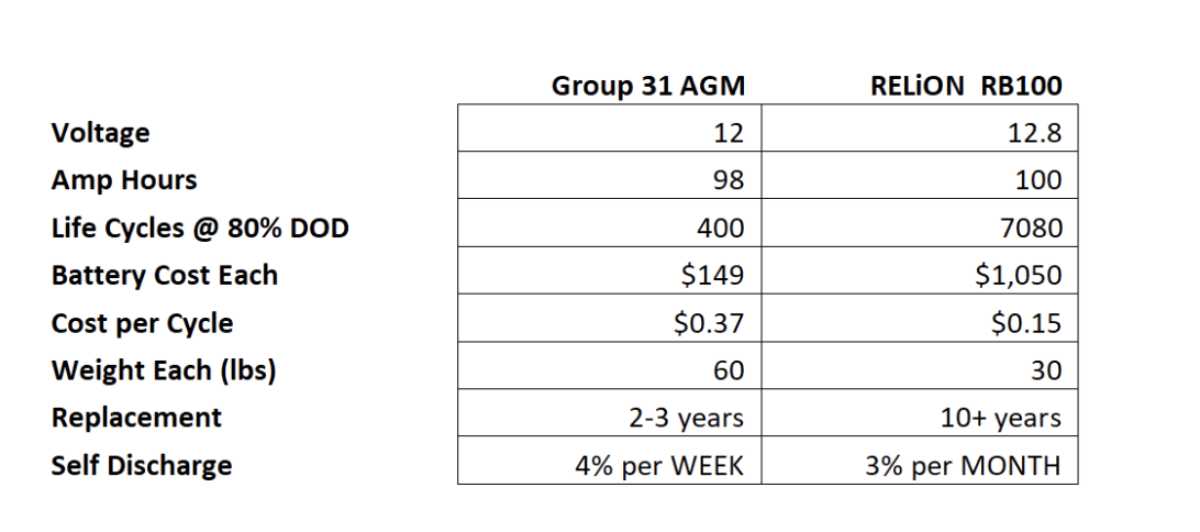Which RELiON battery is right for my RV?
Thinking of switching to lithium for your RV but unsure which battery will work best for your set-up? In this article, we determine which RELiON lithium battery is best for you and the benefits of using lithium.
So you're wondering which type of RELiON lithium battery will work best in your recreational vehicle? Maybe you're shopping for an RV and are curious about which type and capacity of batteries will work best in your new trailer. In this blog, we cover some of the benefits of lithium batteries for your RV and likely battery candidates depending on the size and power requirements of your RV.
Weight
Whether you're driving a Class A motorized coach or towing a small teardrop with your automobile, weight is a primary factor to consider. All vehicles and trailers have a gross vehicle weight rating or maximum capacity that cannot be exceeded. Traditional lead acid Group 24 thru 31 batteries weigh between 60 and 70 pounds each. Conversely lithium batteries are usually less than half the weight of their lead acid counterparts. If you have a bank of eight batteries that is 280 pounds you can use somewhere else. That's 33 additional gallons of fresh water or cargo you can carry. Great if you're boondocking without access to full hookups.
Usable Capacity
Lithium batteries offer a much higher usable capacity at the same amp hour rating when compared directly to lead-acid. In many applications, lead-acid batteries are sized at 50 percent depth of discharge to extend battery life. So, your bank of four 100 amp hour lead-acid batteries only gives you 200 useful amp hours before it needs to be recharged to preserve and extend its life. Lithium batteries offer the ability to maintain constant power and energy at any rate of discharge could allow you to size your bank at half that of a comparable lead-acid bank.
Charge Time
A lead-acid batteries internal resistance increases the deeper it is discharged, this means charge algorithms are designed to slowly raise voltage which increases charging time. Lithium batteries can be charged at a much higher rate because of lower internal resistance. This means less time running a noise and carbon polluting generator to fill your batteries back up. In comparison, group 24 thru 31 lead-acid batteries could take 6-12 hours to charge whereas lithium is four to six time faster charging in 1-3 hours.
Partial State of Charge
Partial state of charge or PSOC is a common killer of lead-acid batteries used in RVs. Like we mentioned earlier, discharging lead-acid batteries beyond 50% of their capacity or not regularly recharging them to 100% adversely effects their lifespan. Imagine you rely on solar panels to recharge your batteries and it's a cloudy day? What if you’re in a campsite that frowns upon running a generator? Lithium batteries are unaffected by not fully charging or regularly operating in a partial charge state. Additionally, lithium batteries can be put in a storage state (50% charge) for the winter or extended periods if you know you won't use your RV for several months. There are no adverse effects and they only lose about 3% of their amp hour capacity for every month in storage.
Cost per Cycle
Although the upfront costs of lithium batteries seem higher, the true cost of ownership is at least less than half of lead acid. This is because the cycle life and longevity of lithium is much greater than lead acid. Even the best AGM batteries found in most RVs have an effective life between 400 cycles at 80% depth of discharge and 800 cycles at 50% depth of discharge. In comparison a lithium battery’s life is 6-10 times longer than a comparable lead-acid battery. Just imagine not having to replace your batteries every 2-3 years!
You can compare the costs and other benefits we’ve discussed for yourself in the table below.

If you need direction determining your power needs, please see this article along with the table below of common batteries purchased for use in different classes of RVs in the graphic below. Please feel free to contact us if you need additional help selecting the right batteries for your RV.